Month One in Málaga
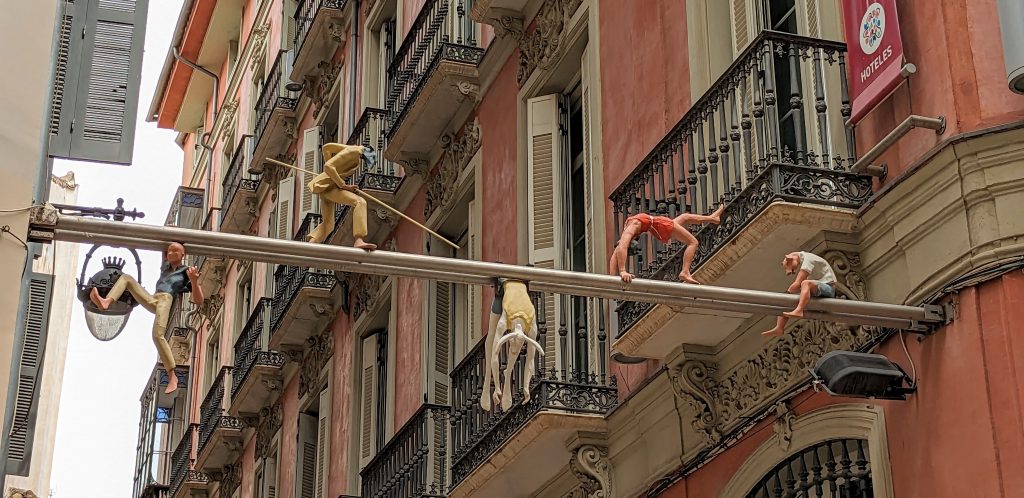
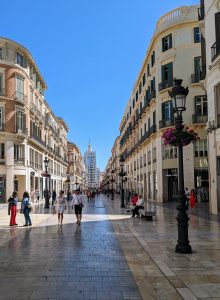 It’s been a month since we left Seattle for Málaga, Spain, thanks to my husband’s perseverance through the gymnastics of the visa labyrinth. Once we got here, I could no longer be a detached bystander. In our first two weeks, we found an apartment, arranged for electricity to be turned on, opened a Spanish bank account, bought a phone so we could have a Spanish phone number, and arranged for Wi-Fi to be installed. I conducted these transactions in my intermediate-level Spanish, grateful that the realtors, banker, and retailers all decelerated their normally rapid speech for me. Because, honestly, as I listen to conversations around me in public, I don’t know if my brain will ever operate fast enough to distinguish the words that fly at impossible speeds from the lips of los andaluces. But it’s not just the velocity, it’s the economy of syllables they practice, omitting the endings of words so that “hasta luego” sounds something like “ha lueg.”
It’s been a month since we left Seattle for Málaga, Spain, thanks to my husband’s perseverance through the gymnastics of the visa labyrinth. Once we got here, I could no longer be a detached bystander. In our first two weeks, we found an apartment, arranged for electricity to be turned on, opened a Spanish bank account, bought a phone so we could have a Spanish phone number, and arranged for Wi-Fi to be installed. I conducted these transactions in my intermediate-level Spanish, grateful that the realtors, banker, and retailers all decelerated their normally rapid speech for me. Because, honestly, as I listen to conversations around me in public, I don’t know if my brain will ever operate fast enough to distinguish the words that fly at impossible speeds from the lips of los andaluces. But it’s not just the velocity, it’s the economy of syllables they practice, omitting the endings of words so that “hasta luego” sounds something like “ha lueg.”
Sometimes all I hear are a few words in a long string of sounds. And sometimes they are the wrong words. I always use my Spanish even though many café and shop workers speak at least some English. So I was speaking Spanish to our waiter at a café when he said something that threw me off. I thought I heard “despedida” (farewell), which made absolutely no sense in the situation. I was stumped. The waiter then proceeded to lecture me in English. “You spoke to me in Spanish so I spoke back to you in Spanish. If you don’t understand, then speak to me in English.” Well, okay, then, young man, shame on me. I felt bad for a whole five minutes. Then I let it go. Life is short and I’m old. By the way, what he’d said was “las bebidas.” Duh. Context is everything. But really, it was more like “la bebida,” with the end sounds characteristically chopped off.
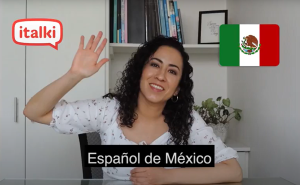 I’m still doing my weekly online Spanish lesson with my Mexican teacher who moved from Toluca, Mexico to France about six months ago, so we’re sort of neighbors now and in the same time zone which is more convenient for scheduling classes. Yeah, I know, I’m learning Mexican Spanish while living in Spain, but she’s a fabulous teacher and I don’t want to quit her. If you’re looking for an online Spanish teacher, who is smart, fun, and kind, I highly recommend Nathalie through italki.
I’m still doing my weekly online Spanish lesson with my Mexican teacher who moved from Toluca, Mexico to France about six months ago, so we’re sort of neighbors now and in the same time zone which is more convenient for scheduling classes. Yeah, I know, I’m learning Mexican Spanish while living in Spain, but she’s a fabulous teacher and I don’t want to quit her. If you’re looking for an online Spanish teacher, who is smart, fun, and kind, I highly recommend Nathalie through italki.
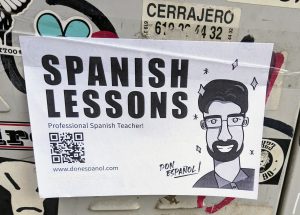 I figured I should also start in-person weekly lessons with a Malagueño but it turns out Sebastián, who I found through a poster on a wall, happens to be from Chile. He’s a linguist and polyglot who also speaks English, German, and Russian. I imagine the brains of multilinguists with multicolored wiring and firecracker explosive synapses. And then there’s mine —flameouts, sputters, the occasional tiny, feeble spark.
I figured I should also start in-person weekly lessons with a Malagueño but it turns out Sebastián, who I found through a poster on a wall, happens to be from Chile. He’s a linguist and polyglot who also speaks English, German, and Russian. I imagine the brains of multilinguists with multicolored wiring and firecracker explosive synapses. And then there’s mine —flameouts, sputters, the occasional tiny, feeble spark.
Speaking of linguistic feats, I’ve been attending a weekly Writers’ Meetup of ex-pats, temporary residents, and peripatetics, at which I’ve listened to two Poles and a German share their writing in English. Will I ever reach a point where I’m writing creatively in Spanish? ¡Qué milagro sería!
Milagro. That’s my segue to Semana Santa. I witnessed the pageantry and spectacle throughout the week both up close and deep in a sea of onlookers. The sound of drums and trumpets reverberated in the centro from late afternoon to the early morning hours. One evening I came home after spending a couple of hours in the street watching processions to find my husband, all comfy on the couch, watching them on TV which provided angles and close-ups difficult or impossible to see in person. What the TV couldn’t provide were the incense-suffused air and the intensity of the ribcage-rattling drums and melancholy beauty of the trumpets—a highly emotive sensory experience even for a nonreligious person like me.
Much of Spain’s history—well, history in general—is shaped by religion. So we went to a Catholic cemetery for some stories from the past. Actually, our excursion to the Cementerio de San Miguel de Málaga, built in the early 19th century, was prompted by my accidental discovery that the American writer Jane Bowles is buried there. While googling some other topic related to Malaga, I came across a reference to Bowles, whose novel Two Serious Ladies was among the 900 or so books I had to give away before moving to Spain. I knew a little about Bowles’s life, but I didn’t know she was buried in Málaga, given a place among the city’s notables. It’s a beautiful old cemetery, whose architecture reflects a variety of styles. It didn’t take long to locate Bowles’s gravesite – a large black marble slab with a quote from Truman Capote engraved on it: Cabeza de gardenia, his name for her. Not far away is the grave of the Málaga poet Salvador Rueda. Some of his lines appear on decorative tiles outside of the legendary El Chinita’s restaurant near our apartment.
Our lives are slowly taking on a rhythm here. Walks in the early morning, at our desks until mid-afternoon, then out for errands and maybe lunch, back for a nap, and then more desk time. The routine is punctuated by Spanish lessons and the occasional social 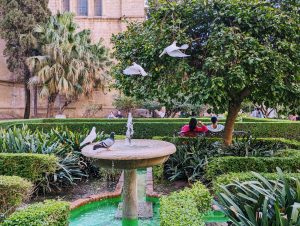 encounter with people I have met here. My favorite evening activity is reading in the cathedral garden. I’m reading La Insumisa, dictionary by my side. It’s an autobiographical novel by Cristina Perri Rossi, a Uruguayan writer and activist who in the seventies was exiled during the dictatorship and has since lived in Barcelona. The book delights me in two ways. The first is that I’m able to move through it fairly easily (reading Spanish is so much easier than speaking it!), though there are plenty of words whose meaning I have to look up when context fails me. The second is the often-deadpan delivery by the charming, rebellious main character of her quirks and escapades, as well as the unsparing look at the solemn and the tragic. Anyway, that’s my assessment after four chapters. But don’t take my word for it. I’m someone who said aula (classroom) when I meant jaula (cage) and received cava when I asked a waiter for agua.
encounter with people I have met here. My favorite evening activity is reading in the cathedral garden. I’m reading La Insumisa, dictionary by my side. It’s an autobiographical novel by Cristina Perri Rossi, a Uruguayan writer and activist who in the seventies was exiled during the dictatorship and has since lived in Barcelona. The book delights me in two ways. The first is that I’m able to move through it fairly easily (reading Spanish is so much easier than speaking it!), though there are plenty of words whose meaning I have to look up when context fails me. The second is the often-deadpan delivery by the charming, rebellious main character of her quirks and escapades, as well as the unsparing look at the solemn and the tragic. Anyway, that’s my assessment after four chapters. But don’t take my word for it. I’m someone who said aula (classroom) when I meant jaula (cage) and received cava when I asked a waiter for agua.
And so it goes. That’s it for month one. Hasta la próxima mes.
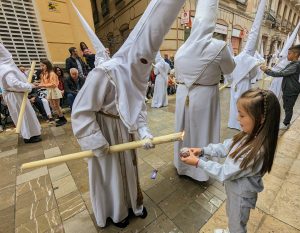
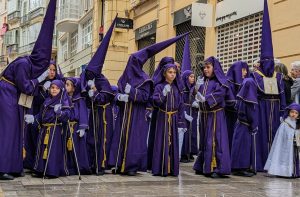
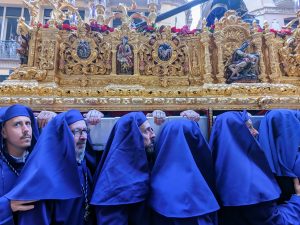
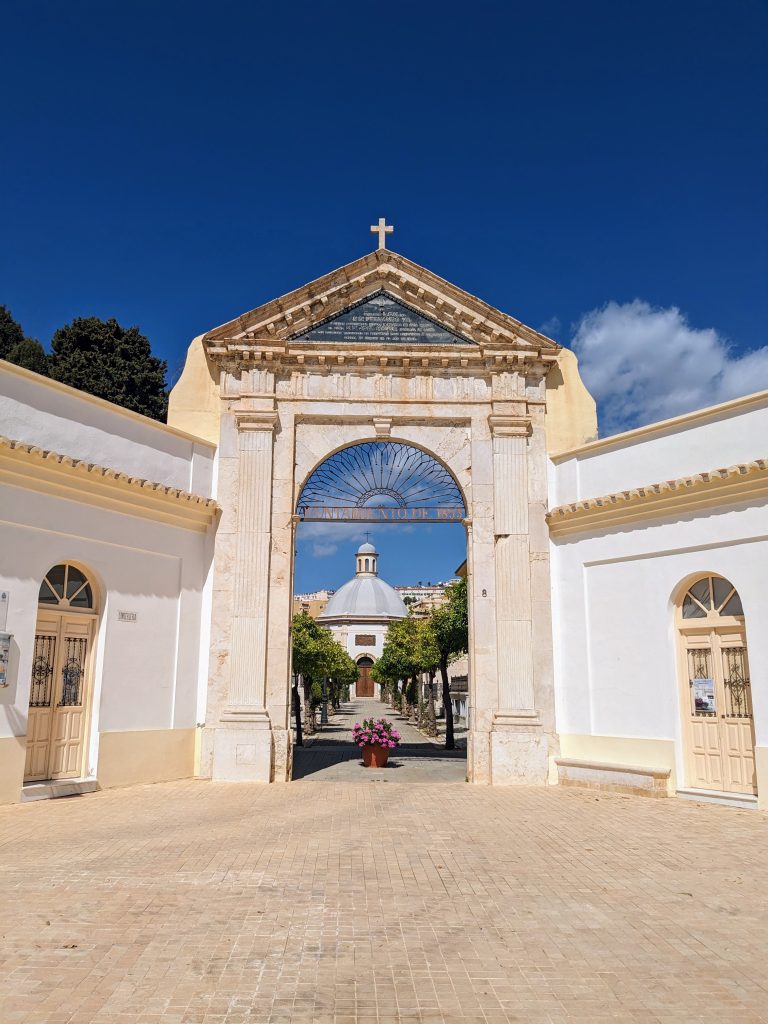
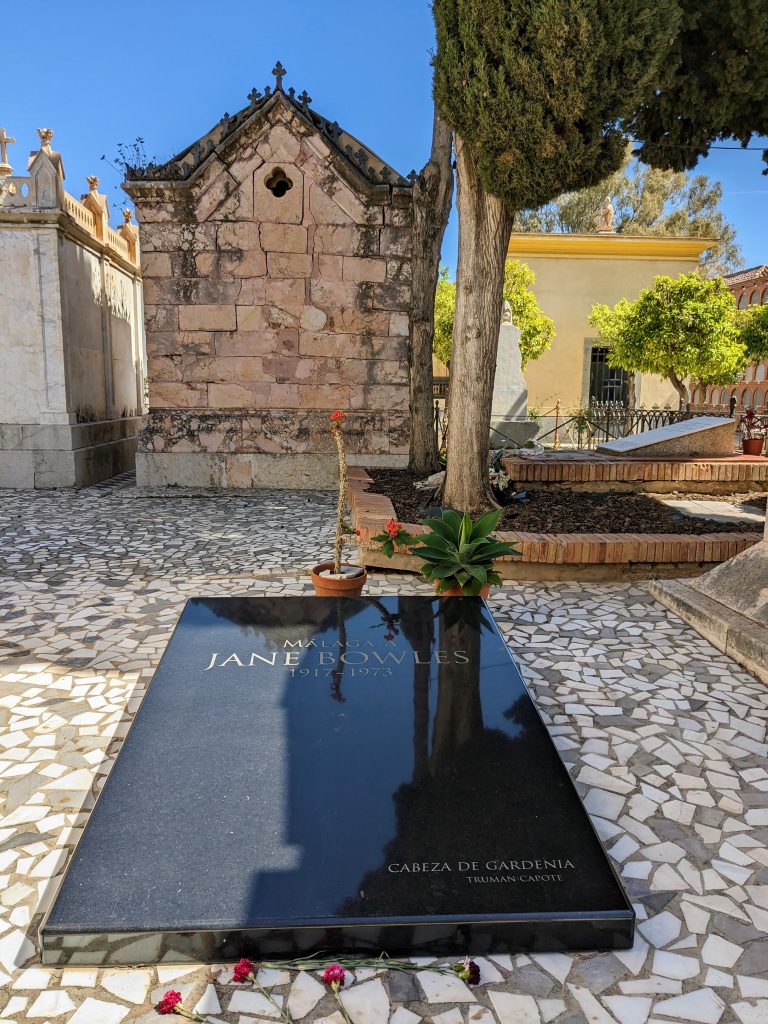
I didn’t know you moved to Spain! How terribly exciting! I love Spain so much. I am an absolute waste at learning languages. I tried so many, many times to learn Spanish, even a little latin and I fail miserably. Turns out, not knowing grammar well (I was never taught it in school for some reason) really hinders the ability to learn languages. Also, funny I’m a writer with little grammar knowhow, but… so it goes.
Always love reading about your life, and cava instead of aqua isn’t all bad. 😉
It feels really good to be here in Spain. Next time I’m served cava I’ll toast to the intuitiveness over grammar know-how of writing.
Love this Donna! Good on you!
Thank you, Martha!
Okay, #1 Grouchy waiters — boo, #2 Gardenia head? Really? #3 I think your brain must be crackling through the synapses!
I think sometimes my brain is a grouchy gardenia head.
i’ve never been (to Spain) but have long been fascinated by the Camino de Satiago stroll/hike. i speak no languages, write poems, draw pictures. i’m caretaking my mother and frankly speaking, waiting for her to die so i can do this hike. certainly i don’t want to rush her along but i’m no springchicken either. hopefully i’ll still be able to walk after she has passed.
sounds like you guys are adapting well. sounds like you’re there for the long haul.
We are adapting well so far and plan to be here for a long while. I hope you do get to walk the Camino.
Really appreciated your comments on Andalusian Spanish which reminded me of time in coastal Venezuela decades ago, and in Cuba. No word endings.
Brave and awe-inspiring your big move.
And I was touched to see Bowles’ gravestone as I’m reading Zambreno’s Heroines which mentions her.
Cool about the mention of Bowles in the book you’re reading. Heroines sounds fascinating. With regard to the Spanish, I think I might have had an easier time if we had moved to Mexico instead.
You made me smile, you made me laugh, but sobre todo, you reminded me of myself eons ago.
Tiempo al tiempo, and soon you’ll speak fluent malagueño! As I read about el Chinitas, I couldn’t help sharing this with you, I hope it will make you smile too! Oops, ok… The settings won’t let me share my link… So if you feel like going to my website, look for a chapter called “The Story of the People’s Tree, Lorca’s Lessons from the Afterlife” to ‘hear him talk about his take on Málaga’.
Lorca loved that city, and his mom Doña Vicenta spent some time in a clinic just at the end of el Paseo del Parque, detrás de la Fuente de las Tres Gracias… ¡Hasta el mes que viene!
Oh, thank you for telling me about your website! I’ll be sure to read the chapter you indicated as well as others. On my walk this morning I’ll think about Doña Vicenta as I pass la Fuente de las Tres Gracias.
Wonderful recap, Donna. I had no idea that Jane Bowles was buried in Malaga. I must make a pilgrimage one day. I loved her work when I read it in my twenties. My most cringy language moment here in Spain—out of many—was when I insisted that my neighbor must try the horse cheese and horse milk at the local farmers market. (Mixed up caballo and cabra. 😣)
Yes, it seems that Bowles lived in a convent here while trying to recuperate from illness. I think I read that she wasn’t buried at San Miguel at first but that her remains were collected from elsewhere in the city by friends and placed at the more notable site later. Oh, our language mishaps! Queso de caballo!
I would say, so far, so good!
It is still cold and wet and rainy here, so you are not missing anything.
I definitely do not miss the cold, wet, and rain!
So many memories! I slept on the beach in Malaga in my early twenties and Semana Santa was, as you say, deeply emotive. And that Spain Spanish, even for me as a bilingual person, is sometimes tough. I often put on subtitles for Spain or Argentinian Spanish shows. But then again, I also put on English subtitles for British shows! And that “theta”… so tempting…
Yes, the Spanish here is a challenge for me, which I’m determined to meet!